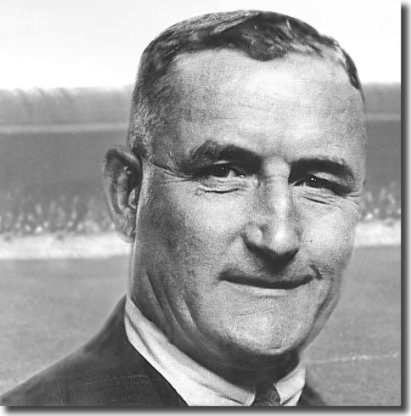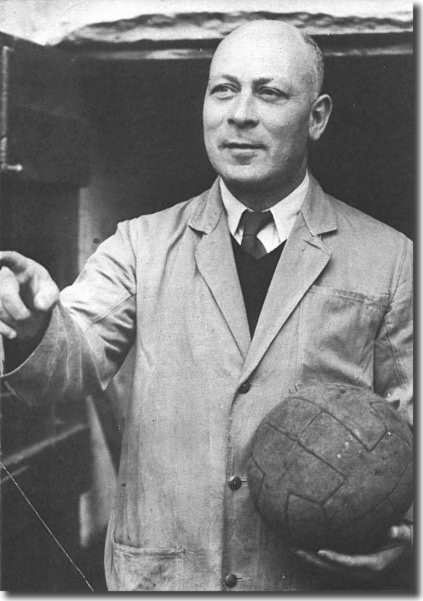 |
 |
 |
The 1930's had been kind to Leeds United. True, they didn't win any silverware
- Arsenal in their golden decade were simply too dominant Manager Billy Hampson had put together a reasonable squad, and even though
Willis Edwards and Gordon Hodgson among others were either gone or long
in the tooth, mature stars such as Wilf Copping, Jim Twomey, and Bobby
Browne were supplemented by up and coming youngsters, including Eric Stephenson,
Jim Milburn, Gerry Henry and Tom Hindle. The war came at the wrong time
for what could have been a very strong team and both Stephenson and former
Leeds player Alan Fowler died in action. Jim Milburn was wounded in 1944,
but returned to Elland Road after the end of the war. The declaration of war came on September 1 1939, three matches into the
new season with Leeds rooted to the bottom of the table without a point
to their name. The club carried on playing throughout the war as the football
authorities organised regional competitions to remove the need for lengthy
and expensive journeys to away games. "Organised" was a fairly generous
description of what went on, as for the most part there was absolute chaos
with games often being cancelled at short notice and teams not being decided
until the very last minute. Leeds did well in the first season, but as the years drew on their form
deteriorated and they slumped lower and lower. In 1945/46, when there
was a relatively well organised competition, Leeds won just 9 times in
a 22 team Northern section competition, conceding 118 goals. They were
adrift at the bottom of the division and things looked ominous, although
the abandonment of promotion and relegation for that season gave the club
a second chance. The breathing space didn't help, however, and 1946/47 was even more dismal.
Leeds United earned just 18 points - the equal lowest First Division total
until Stoke's even more abysmal 1984/85 performance - with only one of
them earned away from Elland Road. Even the arrival of former England
half back Ken Willingham in March could not stem the tide and they conceded
90 goals in the League. Manager Billy Hampson had seen the writing on
the wall for some time and was replaced by his former player, the long-serving
Willis Edwards, when relegation had been confirmed. Edwards could do nothing
in the six games he had to prevent Leeds sliding back into the Second
Division after sixteen years as a Division One side. They were a massive
15 points below the safety level. Not surprisingly, the team's confidence was completely shot and Edwards
was clearly not the right man to halt the slide. Their away form was marginally
better in 1947/48 - they won seven points - but Edwards was moved back
to the post of assistant manager after just a year, following a desperate
struggle Former Wolves boss Major Frank Buckley was the choice of the Leeds board
to replace Edwards and he came with a strong pedigree of success, having
built the Molineux side from a struggling Division Two side to runners
up in both the League and FA Cup. Buckley's arrival saw no immediate improvement
in form but he did unearth a rare find in John Charles. Although 1948/49
saw Leeds coming in 15th, they were only two points above relegation.
In fact, it was one of the tightest relegation scraps ever. Bottom club
Lincoln's fate had been resolved long berfore the final games, but above
them just five points covered the next 13 clubs. Right at the end of the
season 17 year old Charles was given his big chance, playing in the No
5 shirt in the last three matches, during which only two goals were conceded
and those vital two points were collected from two goalless draws. Leeds United had always struggled financially and in 1948 when Buckley
arrived at the club, they were about to post a third successive year of
financial losses. Buckley had seen and done it all before. He boldly and
confidently predicted that he would bring better times to Elland Road.
Charles was only one of a number of younger players he introduced and
he also made significant changes to the club's training regimes. He shook
Elland Road to its very foundations. Neither Hampson nor Edwards had any
real managerial experience to their name when United put them in charge,
but that was something that 64 year old Buckley could certainly not have
been accused of. He had been in management for 25 years, commencing at
Blackpool in October 1923. The challenge he faced at Leeds was similar
to what he had already experienced with Wolves. 1948/49 was hardly a triumph, but finally, after a decade of gradual
decline and dismal performances, something looked like it was being done
to stop the rot at last. The potential of the young John Charles and the
reassurance of the experienced Buckley at the helm gave the Elland Road
faithful some glimmers of hope for the future and as the Forties drew
to a close, Leeds United started to look forwards. They had never been
very successful, apart from briefly during World
War I, but a decade in Division One had made them hungry. for
that - but since they won promotion to the First Division in 1928, the
Elland Road club had only spent one season out of the top flight before
the outbreak of war. As the conflict approached, Leeds were doing pretty
well. Poor runs after Christmas habitually spoiled the good work done
in the autumn, but the side could normally manage a safe mid table position.
for
that - but since they won promotion to the First Division in 1928, the
Elland Road club had only spent one season out of the top flight before
the outbreak of war. As the conflict approached, Leeds were doing pretty
well. Poor runs after Christmas habitually spoiled the good work done
in the autumn, but the side could normally manage a safe mid table position. against relegation to the Third Division for the first time. Leeds eventually
won two of their last three games to guarantee safety in a disappointing
18th place.
against relegation to the Third Division for the first time. Leeds eventually
won two of their last three games to guarantee safety in a disappointing
18th place.